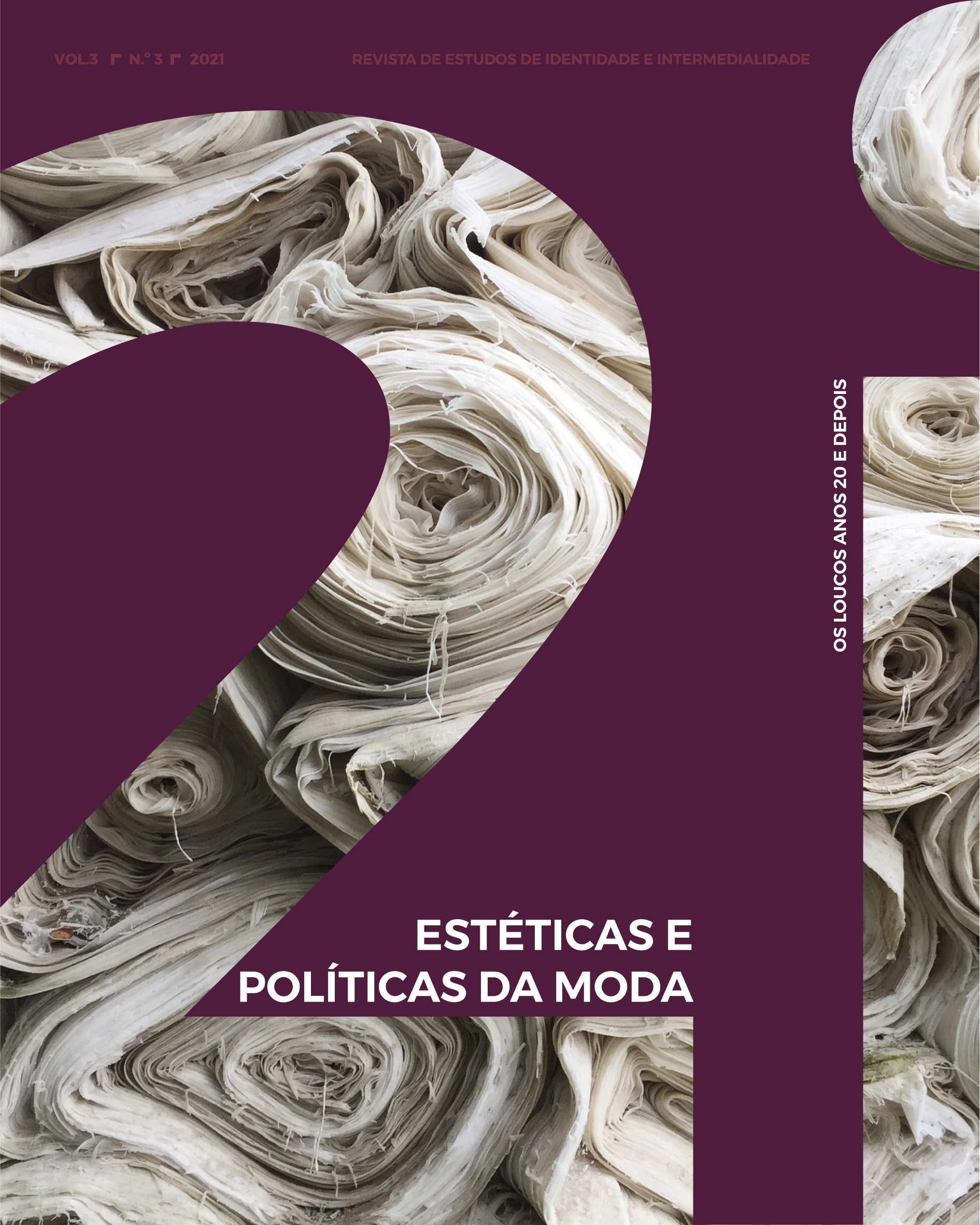Beatle Boots and Lennon Glasses - La moda de los 1960s en la Música Pop
Un acto translativo por The Recalls
DOI:
https://doi.org/10.21814/2i.3150Resumo
La moda es un fenómeno fuertemente relacionado con la música. Los artistas son realmente conscientes de lo que llevan en el escenario y en otros espacios públicos y cómo se presentan a través de los medios de comunicación social. De esta manera, no sólo crean una cierta imagen de sí mismos a través de esta estrategia de auto-escenificación, sino que también muestran su afiliación a una determinada escena. En la década de 1960 se desarrolló un tipo específico de música que, por lo tanto, también se caracterizó por una forma particular de vestir y estilo que se ‘traduce’ debe a su fuerte influencia a la escena musical actual.
The Beatles, como la banda tal vez más influyente del decenio de 1960, con un desarrollo muy interesante en cuanto a su propia moda, sirven de modelo para el estilo de la banda hispano-chilena The Recalls, con sede en Alemania. Su tipo específico de apropiación actualiza, transforma y recontextualiza como un acto de traducción la moda de The Beatles de una manera posmoderna. Este enfoque subraya la posibilidad de establecer un diálogo transcultural e intenta desarrollar una nueva perspectiva sobre otros fenómenos transfronterizos.
Downloads
Referências
Aizawa, K. (2010). Fremdsprachigkeit und Fremdkulturalität – Wider die kulturwissenschaftliche Metaphorisierung der Übersetzung. In: Yamamoto, H. & C. Ivanovic, eds: Übersetzung – Transformation. Umformungsprozesse in/von Texten, Medien, Kulturen (pp. 58–59). Würzburg: Königshausen & Neumann.
Allen, G. (2011). Intertextuality, 2. ed. London/New York: Routledge.
Bachmann-Medick, D. (2014). Cultural turns. Neuorientierungen in den Kulturwissenschaften, 5. ed. Reinbek: Rowohlt.
Bassnett, S. (1990). The translation turn in cultural studies. In: Bassnett, S. & A. Lefevere, eds.: Translation, history, and culture (pp. 123–140). London: Pinter Publishers.
Bennett, A. (2000): ’Sitting in an English garden’: Comparing representations of ‘Britishness’ in the songs of the Beatles and 1990s Britpop groups”. In: Inglis, I., ed: The Beatles, popular music and society (pp. 189–206). London: Macmillan Press.
Bhabha, H. K. (2010 [1994]). The location of culture. London/New York: Routledge.
Cohen, S. (2002). Folks devils and moral panics, 3. ed. Abingdon: Routledge.
Diederichsen, D. (1999). Pop – deskriptiv, normativ, emphatisch. In: Hartges, M. et al., eds.: Pop, Technik, Poesie. Die nächste Generation (pp. 36–44). Reinbek: Rowohlt.
__________ (2014). Über Pop-Musik. Köln: Kiepenheuer & Witsch.
Doorslaer, L. van (2017). A concept’s coming of age. Developments in the use of the concept of culture in Translation Studies. In: Heller, L., ed.: Kultur und Übersetzung. Studien zu einem begrifflichen Verständnis (pp. 37–50). Bielefeld: transcript.
Eagleton, T. (1987). Awakening from modernity. Times Literary Supplement 20.2.
Eco, U. (1985). Reflections on “The Name of the Rose” (trad. William Weaver). London: Secker & Warburg.
Engelskircher, K. (2021). Intercultural dialogue via music – The Beatles’ legacy as a translational act by the example of The Recalls. Culture and Dialogue, 9/1, issue: Music, Culture and Dialogue, coming up.
Ernst, T. (2001). Popliteratur. Hamburg: Rotbuch.
Frith, S. (1996). Performing rites. Oxford: Oxford University Press.
__________ (1987). Towards an aesthetic of popular music. In: Leppert, R. & S. McLary, eds.: Music and society: The politics of composition, performance and reception (pp. 133–149). Cambridge University Press.
Greene, R. et al. (eds.) (2012). The Princeton encyclopedia of poetry and poetics, 4. ed. Princeton: Princeton University Press.
Gregory, G. (2019). Boy Bands and the performance of masculinity. New York/London: Routledge.
Gómez Peña, G. (1996). Friendly cannibals. San Francisco: Artspace Books.
Harvey, D. (1990). The condition of postmodernity. Malden: Blackwell.
Hebdige, D. (1979). Subculture: The meaning of style. London: Routledge.
Heller, L. (2017). Eulen nach Athen. Provokation und Reflexionsanstöße des translational turn der Kulturwissenschaft für die Translationstheorie. In: Heller, L., ed.: Kultur und Übersetzung. Studien zu einem begrifflichen Verständnis (pp. 93–115). Bielefeld: transcript.
Hoesterey, I. (2001). Pastiche: Cultural memory in art, film, literature. Bloomington: Indiana University Press.
Hutcheon, L. [1989] (2002). The politics of postmodernism, 2. ed. London/New York: Routledge.
Hutcheon, L. (1991). The politics of postmodern parody. In: Plett, H.F., ed.: Intertextuality (pp. 225–236). Berlin/New York: de Gruyter.
Jakobson, R. (1981). Linguistische Aspekte der Übersetzung. In: Wilss, W., ed.: Übersetzungswissenschaft (pp. 189–198). Darmstadt: Wissenschaftliche Buchgesellschaft.
Jameson, F. (1998). Postmodernism and consumer society. In: Foster, H., ed.: The anti-aesthetic. Essays on postmodern culture (pp. 127–144). New York: The New Press.
Kapurch, K. (2020). The Beatles, fashion, and cultural iconography. In: Womack K., ed.: The Beatles in context (pp. 247–258). Cambridge: Cambrigde University Press.
King, M. (2016). Men, masculinity and the Beatles. London/New York: Routledge.
Lefevere, A. (2009). Interpretation, Übersetzung, Neuschreibung. Ein alternatives Paradigma. In: Hagemann, S., ed.: Deskriptive Übersetzungsforschung. Eine Auswahl (pp. 63–91). Berlin: SAXA.
__________ (1985). Why waste our time on rewrites? The trouble with interpretation and the role of rewriting in an alternative paradigm. In: Hermans, T., ed.: The manipulation of literature. Studies in literary translation (pp. 215–243). London/Sydney: Croom Helm.
Lyotard, J.-F. (1979). La condition postmoderne. Rapport sur le savoir. Paris: Minuit.
__________ (1992). The Postmodern explained to children. Correspondence 1982–1985. Minneapolis: University of Minnesota Press.
Maitland, S. (2017). What is cultural translation? London/New York: Bloomsbury Academic.
Marshall, P.D. (2000). The celebrity legacy of the Beatles. In: Inglis, I., ed.: The Beatles, popular music and society: A thousand voices (pp. 163–175). New York: St. Martin’s Press.
McRobbie, A. (1994). Postmodernism and popular culture. London/New York: Routledge.
Miller, J. (2011). Fashion and Music. Oxford/New York: Berg.
Moore, A.F. (2001). Rock: The primary text. Aldershot: Ashgate.
Neaverson, B. (2000). Tell me what you see: the influences and impact of the Beatles’ movies. In: Inglis, I., ed: The Beatles, popular music and society (pp. 150–162). London: Macmillan Press 2000.
Norman, P. (2008). John Lennon. The Life. Harper Collins E-Books.
__________ (2016). Paul McCartney. The Biography. London: Weidenfeld & Nicolson.
Pym, A. (2010). Exploring translation theories. London/New York: Routledge. 2010
Roessner, J. (2006). We all want to change the world. Postmodern politics and the Beatles’ White Album. In: Womack, K. & T.F. Davis, eds.: Reading the Beatles. Cultural Studies, Literary Criticism, and the Fab Four (pp. 147–158). Albany: State University of New York Press.
Savage, J. (2017, 8th June). You say you want a sexual revolution: Why 1967 is the year pop came out. The Guardian. Consulted in https://www.theguardian.com/music/2017/jun/08/1967-the-year-that-pop-came-out-beatles-rolling-stones-kinks (9.10.2020).
Sennett, R. (2003). Resistance. In: Bull, M. & L. Back, eds.: The auditory culture reader. Oxford: Berg.
Sims, J. (1999). Rock/Fashion. London: Omnibus Press.
Spicer, M. (2009). Strategic intertextuality in three of John Lennon’s late Beatles songs. Gamut, 2/1, pp. 347–376.
Stokes, Martin (1994). Introduction: Ethnicity, identity and music. In: Stokes, M., ed: Ethnicity, identity and music: the musical construction of place (pp. 1–27). Oxford: Berg 1994.
Sturge, K. (2011). Cultural translation. In: Baker, M. & G. Saldanha, eds.: Routledge encyclopedia of translation studies, 2. ed. (pp. 67–69). London/New York: Routledge.
The Beatles (2000). The Beatles Anthology. San Francisco: Chronicle Books.
Tonelli, C.J. (2011). Musical pastiche, embodiment, and intersubjectivity: Listening in the second degree. San Diego: University of California.
Toro, A. de (1996). Die Postmoderne und Lateinamerika (mit einem Modell für den lateinamerikanischen Roman). In: E. Höfner & Schoell. K., eds.: Erzählte Welt. Studien zur Narrativik in Frankreich, Spanien und Lateinamerika (Theorie und Kritik der Kultur und Literatur, Bd. 8) (pp. 259–299). Frankfurt am Main: Vervuert.
__________ (2006). Hacia una teoría de la cultura de la ‘hibridez’ como sistema científico ‘transrelacional’, ‘transversal’ y ‘transmedial’. In: Toro, A. de, ed.: Cartografías y estrategias de la ‘postmodernidad’ y la ‘postcolonialidad’ en Latinoamérica. ‘Hibridez’ y ‘Globalización’ (pp. 195–242). Frankfurt: Iberoamericana/Vervuert, TKKL/TCCL, Vol. 32.
__________ (2014). Los fundamentos del pensamiento occidental del siglo XX: La ‘postmodernidad’ y la ‘postcolonialidad’. In: Gadea, C.A. & E. Portanova Barros, eds.: A “questão pós” nas Ciências Sociais. Crítica, estética, política e cultura (pp. 97–166). Curitiba: Appris.
Wagner, B. (2009). Kulturelle Ü. Erkundungen über ein wanderndes Konzept, Kakanien, Revisited, 1–8. http://www.kakanien.ac.at/beitr/postcol/BWagner2.pdf (10.10.2019).
Whiteley, S. (2006). “Love, love, love”. Representations of gender and sexuality in selected songs by the Beatles. In: Womack, K. & T.F. Davis, eds.: Reading the Beatles. Cultural Studies, Literary Criticism, and the Fab Four (pp. 55–69). Albany: State University of New York Press 2006.
Wolf, M. (2010). ‘Kulturelle Übersetzung‘ – Spielwiese für übersetzerische Beliebigkeiten oder Spielarten von Übersetzung ‘nach Babel’? In: Yamamoto, H. & C. Ivanovic, eds.: Übersetzung – Transformation. Umformungsprozesse in/von Texten, Medien, Kulturen (pp. 44–55). Würzburg: Königshausen & Neumann.
Quoted interviews with The Recalls:
Interview by Kathrin Engelskircher with Jonathan Neira, Stuttgart/Mannheim (19.2.2020) and Momo Lebrón, Cologne/Mannheim (13.3./16.3.2020).
Interview by Kathrin Engelskircher with The Recalls, Hamburg (26.6.2020).
Downloads
Publicado
Como Citar
Edição
Secção
Licença
Direitos de Autor (c) 2021 Kathrin Engelskircher

Este trabalho encontra-se publicado com a Creative Commons Atribuição-NãoComercial 4.0.


.jpg)










